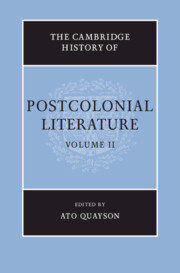Book contents
- Frontmatter
- 21 The language question in India and Africa
- 22 English and the development of postcolonial literature
- 23 Religion and postcolonial writing
- 24 Postcolonial responses to the Western canon
- 25 Island writing, Creole cultures
- 26 Magical realism
- 27 Palimpsest and hybridity in postcolonial writing
- 28 The narrative forms of postcolonial fiction
- 29 Poetry and postcolonialism
- 30 Primitivism and postcolonial literature
- 31 Popular culture and postcolonial literary production in Africa and India
- 32 Film and postcolonial writing
- 33 Fanon, Memmi, Glissant and postcolonial writing
- 34 Negritude and postcolonial literature
- 35 Publishing, prizes and postcolonial literary production
- 36 Key journals and organizations
- Bibliography
- Index
- References
25 - Island writing, Creole cultures
Published online by Cambridge University Press: 28 January 2012
- Frontmatter
- 21 The language question in India and Africa
- 22 English and the development of postcolonial literature
- 23 Religion and postcolonial writing
- 24 Postcolonial responses to the Western canon
- 25 Island writing, Creole cultures
- 26 Magical realism
- 27 Palimpsest and hybridity in postcolonial writing
- 28 The narrative forms of postcolonial fiction
- 29 Poetry and postcolonialism
- 30 Primitivism and postcolonial literature
- 31 Popular culture and postcolonial literary production in Africa and India
- 32 Film and postcolonial writing
- 33 Fanon, Memmi, Glissant and postcolonial writing
- 34 Negritude and postcolonial literature
- 35 Publishing, prizes and postcolonial literary production
- 36 Key journals and organizations
- Bibliography
- Index
- References
Summary
Is it possible to speak of island literatures in global, comparative terms? Are geography and colonial history both so influential that we can say that they have produced an identifiable body of postcolonial island literatures? This chapter explores methodologies for comparing island writing by turning to contemporary literature in English from the Caribbean, Indian and Pacific archipelagoes, foregrounding the important contributions made by island writers to postcolonial discourse and literature. Although one might arguably define every land mass on the globe as an island, this chapter focuses on the literary production of former European colonies in the global south, particularly tropical islands with plantation, diaspora and creolization histories, as well as indigenous literatures in white settler nations. Although the concerns explored here are not restricted to island contexts, this chapter suggests that the collusion of geography and history has made these particular issues more prevalent in contemporary island writing than in other bodies of postcolonial literature.
Colonial narratives and the tourist industry have long depicted island space as remote, isolated and peripheral to modernity. Yet island writers have demonstrated the ways in which centuries of transoceanic diaspora and settlement have rendered island spaces as vital and dynamic loci of cultural and material exchange. Contrary to the assumption that the privileged sites of history and modernity are continental (or generated from the British archipelago), many scholars have demonstrated that tropical islands and peoples were integral to the development of anthropology, botany, environmentalism, plantation capitalism, nuclear weapons and even the English novel.
- Type
- Chapter
- Information
- The Cambridge History of Postcolonial Literature , pp. 802 - 832Publisher: Cambridge University PressPrint publication year: 2012
References
- 21
- Cited by



